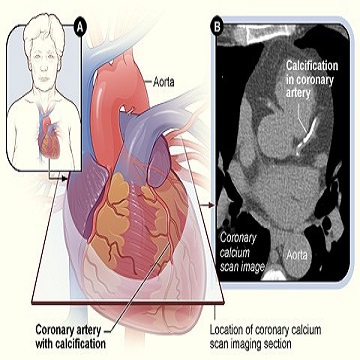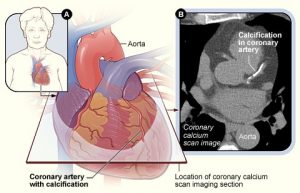
Heart scan/coronary calcium scan

What is Heart scan/coronary calcium scan?
A heart scan, also known as a coronary calcium scan, is a specialized X-ray test that provides pictures of your heart that can help your doctor detect and measure calcium-containing plaque in the arteries.
A plaque inside the arteries of your heart can grow and restrict or blood flow to the muscles of the heart. Measuring calcified plaque with a heart scan may allow your doctor to identify possible coronary artery disease before you have signs and symptoms. Heart scan/coronary calcium scan
Why it’s done
A heart scan uses a specialized X-ray technology called multidetector row or multislice computerized tomography (CT), which creates multiple images of plaque deposits in the blood vessels. The imaging test provides an early look at levels of plaque.
Plaque is made up of fats, cholesterol, calcium and other substances in the blood. It develops gradually over time, long before there are any signs or symptoms of the disease. These deposits can restrict the flow of oxygen-rich blood to the muscles of the heart. Plaque also may burst, triggering a blood clot that can cause a heart attack.
When is a heart scan not used?
A heart scan requires exposure to radiation. While the exposure is generally considered safe, the scan isn’t recommended if the risk of radiation exposure outweighs any potential benefit.
According to the American College of Cardiology and the American Heart Association guidelines, a heart scan may not be recommended for the following people:
- Men under age 40 and women under age 50, because it’s unlikely calcium can be detected at younger ages
- People who have a very low risk, because detectable calcium is highly unlikely if you don’t have a family history of heart attacks at an early age
- People who already have a known high risk (especially heavy smokers or those with diabetes or very high cholesterol), because the heart scan will likely not provide any additional information to guide treatment
- People with symptoms or a diagnosis of coronary artery disease, because the procedure won’t help doctors better understand the disease progression or risk
- People who already had an abnormal coronary calcium heart scan
When is a heart scan used?
A heart scan may help guide treatment if you have a low to moderate risk of heart disease or if your heart disease risk isn’t clear. Your doctor can tell you if you might benefit from having a heart scan based on your risk factors.
A heart scan also may help motivate people at a moderate risk to make important lifestyle changes and follow treatment plans.
Results
The result of the test is usually given as a number called an Agatston score. The score reflects the total area of calcium deposits and the density of the calcium.
- A score of zero means no calcium is seen in the heart. It suggests a low chance of developing a heart attack in the future.
- When calcium is present, the higher the score, the higher your risk of heart disease.
- A score of 100 to 300 means moderate plaque deposits. It’s associated with a relatively high risk of heart attack or another heart disease over the next three to five years.
- A score greater than 300 is a sign of very high to severe disease and heart attack risk.
You also may receive a percentile score, which indicates your amount of calcium compared to people of the same age and sex.
